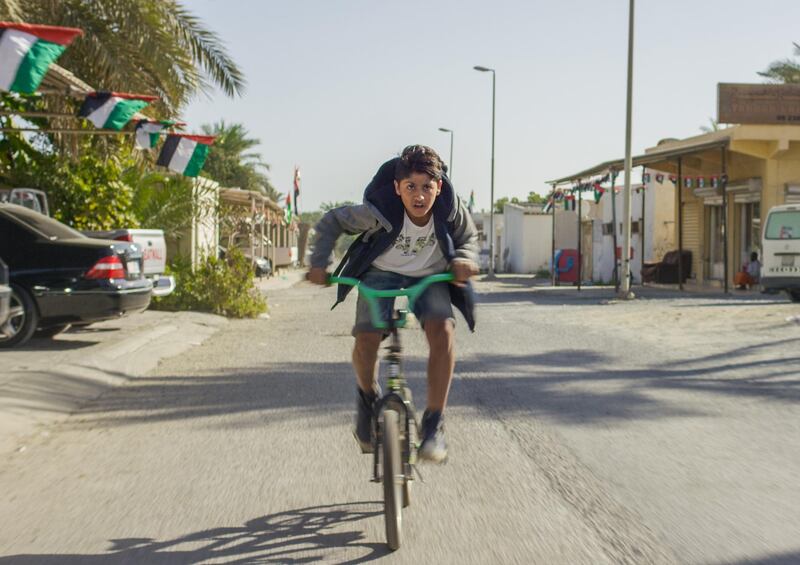Emirati cinema has been conceptually spreading its wings in recent years. There has been horror (Djinn, 2013), a psychological thriller (Zinzana, 2015), a dystopian work (The Worthy, 2016) and an alien-invasion sci-fi romp (Aerials, 2016). The UAE industry is gradually ticking the genre boxes, and it can now add a sporting drama to the mix with yesterday's Abu Dhabi premiere of Amer Salmeen Al Murry's Fan of Amoory.
The film, which goes on general release this weekend, tells the story of a young Emirati, played by Going to Heaven's Jumaa Al Zaabi, who dreams of becoming a professional footballer, inspired by his hero, UAE national team icon Omar Abdulrahman (also known as the titular Amoory). The youngster faces opposition from family, friends and neighbours, but clings onto his dream, with thoughts of his hero never far away.
“He fights for his dreams, and when he reaches them, the dreams then become bigger,” explains director and writer Al Murry. “This is our message to the new generation: once you believe in something, you have to fight for it.”
Al Murry is a familiar face on the UAE movie scene – while Fan of Amoory is his directorial debut, he previously produced his brother Saeed's 2015 feature Going to Heaven.
“We were really pleased with that movie’s success. It won 13 awards... but this movie is totally different,” he says. “It’s really ambitious for an Emirati movie. It’s the first time a local movie has shot 95 per cent outdoors on location, and we shot for 39 days. That’s a long time for a UAE movie – it’s usually 20 days at most.
“Plus, we were dealing with a cast of kids. In some scenes, we had 20-plus young players. How do you deal with that? They lose attention; a lot of them are new to acting. It was very difficult, but this movie was my baby. My hand is in every frame and I hope it will reach a lot of people.”
The bigger scale of Al Murry's movie is perhaps a sign of growth in the UAE movie industry. Following the hugely symbolic release of Ali F Mostafa's entirely UAE-funded and shot City of Life in 2009, there was a two-year gap before another UAE movie – Nawaf Al Janahi's 2011 Sea Shadow – would make it to the big screen. There was then a pause until 2013's Image Nation-produced Djinn – and that movie attracted question marks over its Emirati credentials thanks to its American director (Texas Chainsaw Massacre's Tobe Hooper) and crew. Since 2014, however, at least 14 Emirati movies have had some kind of cinema release.
Al Murry agrees that things are improving. "We have better knowledge and more courage now," he says. "I was planning to write and direct a movie for a long time. Maybe compared to other directors, I gambled with my first film. I started off big, and that's why we got very tired, there was a lot of skill and a lot of work required.
“With most Emirati movies you won’t find this many locations, this big a cast. That’s why I was involved in everything, I concentrated a lot on the backgrounds, the scenes, the music, everything, because this film is my baby, and when I deliver my baby I want it to be healthy.”
One man who is ideally positioned to comment on the current state of UAE cinema, and Fan of Amoory's place within it, is actor Mansoor Al Feeli. The cinema veteran has appeared in, by his own estimation, "12 or 13" Emirati films, alongside a vast body of regional work. He plays the would-be football hero's not-entirely supportive father.
“In the past two or three years, I think we’ve really started growing up,” Al Feeli says. “It will carry on, but I still think we need some kind of jury or council to select the movies that are going to be in theatres. We do have some great movies, but equally some movies are taking us backwards.”
Al Feeli reveals that he has rejected three scripts in the past few months on these grounds, and adds that it is incumbent on all involved in UAE films to carry out quality assurance. "It's everybody's responsibility, even the actors," he says. "They can't just accept scripts because they want to be in a movie. The problem is they'll make the movies anyway, they'll fail at the box office and it takes us back a few steps, which isn't right."
__________________
Read more:
The burgeoning UAE film industry empowers the disenfranchised
Saudi filmmakers celebrate the end of the 35-year cinema ban
Emirati box office smash set for a sequel
__________________
Thankfully, Al Feeli is confident that Amoory isn't regressive. "This is a definite step up," he insists. "There were lots of locations – the playground, the football pitch – and a big cast of kids. I haven't seen it yet, but I hope it will be just as good as I expect."
Al Feeli's screen wife is played by Iraqi actress Alaa Shaker, herself a veteran of at least six UAE films, alongside her film, TV and theatre work in Iraq. She too is positive about Amoory. "This is my first experience working with Amer and I liked it because he works very professionally with everything – shooting, writing, directing," she says. "He's showed such dedication, so I hope it's successful."
She won’t have too long to wait to find out.
Fan of Amoory is showing in UAE cinemas from February 8





